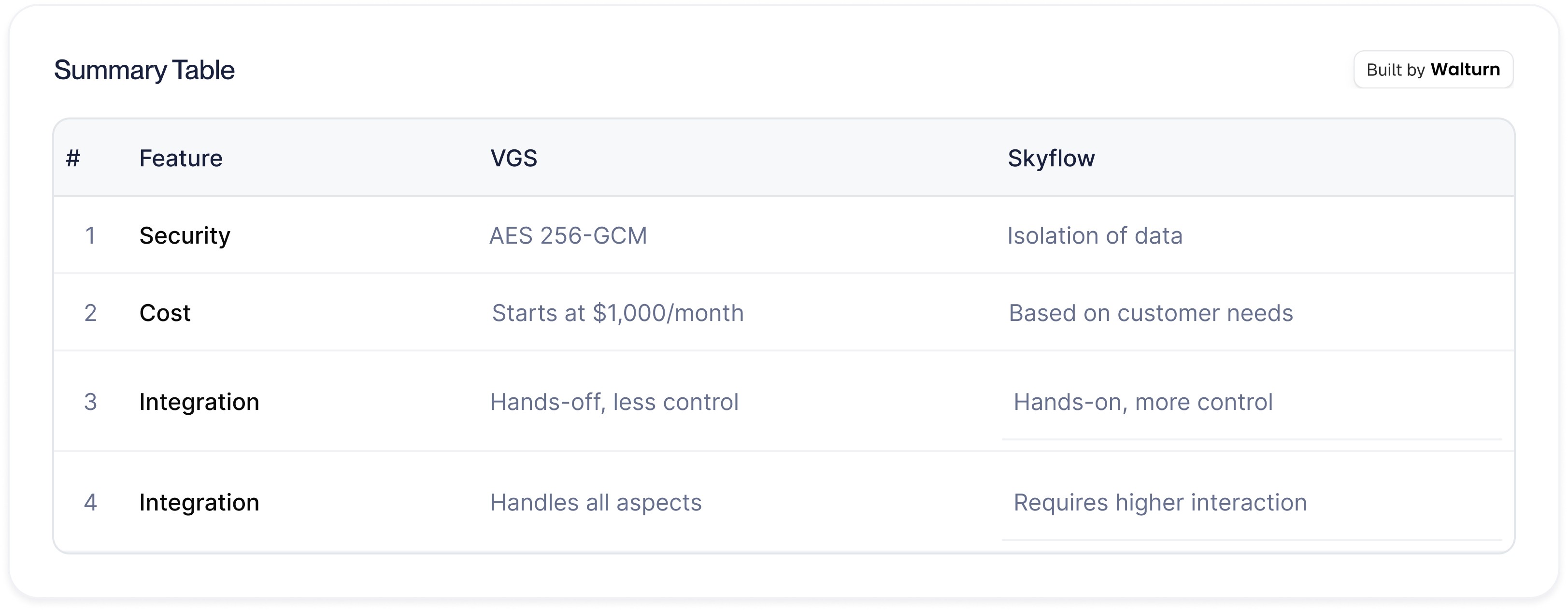Comparing VGS and Skyflow PCI Vaults
Summary
VGS and Skyflow are top PCI-compliant vaults for card data. VGS enables quick compliance with easy integration, while Skyflow offers flexible, API-driven access. VGS uses simple pricing, and Skyflow offers custom options. Both focus on security: VGS is hands-off, and Skyflow provides more control.
Key insights:
Security Approaches: VGS uses tokenization, encryption, and multifactor authentication to protect important data, while Skyflow makes use of isolation, access control, and application-level encryption.
Pricing Models: VGS offers transparent packages starting at $1,000/month, while Skyflow provides custom, flexible pricing based on specific needs.
Integration Ease: VGS simplifies integration with a Zero Data Integration model, while Skyflow offers more control through an API-driven architecture, though it may require more technical knowledge.
Compliance Levels: VGS helps businesses achieve PCI DSS Level 1 compliance in 21 days, while Skyflow offers more flexibility but requires businesses to manage more compliance aspects themselves.
Customization vs. Simplicity: VGS focuses on simplicity and scalability, making it easier for businesses to focus on growth, while Skyflow offers more customization and control for businesses with complex data handling needs.
Introduction
Securing sensitive card data is crucial for any organization handling customer data, and the Payment Card Industry Data Security Standard (PCI DSS) ensures that companies meet the strict requirements to protect cardholders. Two leading solutions are Very Good Security (VGS) and Skyflow, both of which offer PCI-compliant vaults designed to protect sensitive data. This insight goes through the key features of VGS and Skyflow, to help organizations choose the best solution for the security of their data.
What is a PCI-Compliant Vault?
A PCI-compliant vault is a data storage solution designed to protect sensitive card information and ensure compliance with the Payment Card Industry Data Security Standard. These vaults use advanced encryption, tokenization, and other security measures to safeguard cardholder data from unauthorized access.
By storing sensitive data in a PCI-compliant vault, businesses reduce the risk of data theft while meeting the requirements set by PCI DSS. These vaults also help organizations outsource the burden of managing complicated compliance requirements themselves. Both VGS and Skyflow offer PCI-compliant vaults, which enables businesses to focus on their core operations without compromising security.
Overview of VGS
VGS simplifies PCI compliance for businesses by allowing them to handle sensitive payment data without directly touching it. Through tokenization, VGS replaces raw payment information with secure tokens, which helps organizations stay compliant with PCI DSS requirements. VGS enables continuous PCI compliance and reduces the burden and cost of managing secure environments. Lastly, VGS allows businesses to achieve PCI level 1 certification in as little as 21 days. This way, businesses can focus on growth rather than data security.
Overview of Skyflow
Skyflow offers a privacy vault designed for PCI compliance, which helps businesses ensure that all sensitive information such as payment card information (PCI) is secure. This simplifies compliance by isolating and protecting data while also making it easier to integrate with major payment processors like Visa, Plaid, and Stripe. Skyflow reduces costs by eliminating the need for in-house solutions and the pre-built integrations ensure safe card issuance and improve both security and user experience. The architecture also supports compliance with data residency laws and data governance, making it a comprehensive solution for fintech, retail, healthcare, and other industries.
Comparison: VGS vs. Skyflow
1. Security Features
VGS and Skyflow both prioritize industry-leading security mechanisms for safeguarding data, but they take different approaches to implementing these. VGS stores data in segregated vaults, encrypts it with AES 256-GCM and AEAD mode ciphers, and regularly rotates the encryption keys stored within hardware security modules (HSMs). This ensures that the encryption and decryption processes are highly secure. Dashboard access to VGS requires multifactor authentication (MFA), and the session cookies are encrypted and stored locally, while passwords are individually salted and hashed for additional security. VGS operates within an AWS virtual private cloud, which means minimal latency and 24/7 monitoring for potential security threats. To maintain system integrity, they also conduct regular third-party vulnerability assessments, and penetration testing, and have strong incident response capabilities. Lastly, compliance is a critical part of VGS’s security posture, as VGS complies with PCI DSS requirements.
Skyflow, on the other hand, offers an equally strong security framework that is centered around isolation, customization, and access control. Data within Skyflow’s platform is encrypted with application-level encryption and stored in isolated vaults, with keys managed by Skyflow’s systems. The architecture allows high-level control to “access rules”, isolating data not just across customers but also at the vault level. Skyflow uses the principle of least privilege, which ensures that people have access only to what is essential for their roles. This also means that direct access to production systems requires explicit, documented approval. This approach extends to external systems as well, where only authorized entities can access customer vault data. Their infrastructure also provides logging, continuous monitoring, frequent vulnerability scans, and a bug bounty program to identify and deal with threats. Furthermore, Skyflow uses a “multi-region” backup system to ensure minimal data loss in the event of an incident.
2. Cost
VGS offers clear packages, starting at $1,000/month for the Starter Package, where the number of interactions with the VGS vault can impact pricing. This includes token creation or exchanging sensitive data, allowing the business to store up to 100 million records. VGS also offers a Growth Package, which will enable customers to customize the payment structure with additional services like PCI compliance, network tokens, and large file transfers.
On the other hand, Skyflow does not provide fixed pricing publicly. Instead, they offer flexible pricing based on the specific needs of their customers. This allows for tailored solutions and negotiations. The businesses can adapt the service to their scale and usage patterns without a standard price point, making it harder to predict upfront costs compared to VGS.
3. Ease of Integration
VGS provides a straightforward approach to integration with its Zero Data Integration model. It has a series of guides, starting with the Introductory Guide that helps set up a proxy for secure data handling, which is followed by detailed steps for securing inbound and outbound connections. VGS simplifies the process, making it easier for businesses to securely collect and route data with minimal effort. It also provides code samples, making it easy for developers to implement features using familiar programming languages. This streamlined approach minimizes the effort required to secure sensitive data without needing to alter the existing infrastructure.
Skyflow emphasizes the ease of use through its API-driven architecture. It offers a Quick-start vault template that allows developers to start managing sensitive data almost immediately. Integration would involve setting up environment variables and using simple curl commands to insert and retrieve data. Skyflow also offers tokenization options to protect sensitive data, while also offering more control over data access through its vault schema and access policies. While it is API-centric and flexible, the setup may require more technical knowledge compared to VGS, specifically in the terms of managing environment variables, but it is still designed to be developer-friendly.
4. Compliance
Both solutions offer strong options to protect sensitive payment data and reduce the compliance burden for businesses. VGS allows organizations to collect, protect, and send transfer data through tokenization, which effectively removes sensitive data from the infrastructure. This helps companies achieve PCI DSS level 1 compliance in as little as 21 days. VGS simplifies the whole process with a never changing architecture and ensures that sensitive data is never accessed, which reduces not only compliance work but also the costs associated with maintaining a PCI-compliant environment. It focuses on scalability, allowing businesses to grow without worrying about the increasingly complicated compliance requirements.
Skyflow, on the other hand, emphasizes flexibility. It leverages its privacy vault technology to tokenize and store payment data securely. Unlike VGS, which offers PCI DSS Level 1 compliance in 21 days, Skyflow guides companies towards PCI DSS Level 2, with the option to progress to Level 1 with the help of a Qualified Security Assessor. Furthermore, Skyflow requires companies to handle many of the aspects of compliance, such as managing hardware security and user authentication, which gives a more hands-on approach to getting compliant.
5. Summary Table

Conclusion
Both VGS and Skyflow offer strong PCI-compliant vault solutions to safeguard sensitive data, but they differ in terms of approach, pricing, and ease of integration. VGS provides a solution that is focused on simplifying compliance and integration, making it an attractive option for businesses looking for fast compliance and low involvement. Skyflow, however, offers more flexibility, especially in terms of control, which is suitable for companies that need more hands-on customization. Ultimately, the best option depends on the organization’s specific requirements and its proficiency with technology.
Authors
Simplify PCI Compliance with Walturn's Expertise
Are you considering PCI-compliant vault solutions like VGS or Skyflow? Walturn can help you navigate these options to secure your sensitive data effortlessly. Our consulting services are designed to align with your organization's unique needs, guiding you through the complexities of data security and compliance. Let us help you make an informed decision so you can focus on your business with confidence.
References
PCI Security Standards Council. “Official PCI Security Standards Council Site - Verify PCI Compliance, Download Data Security and Credit Card Security Standards.” Www.pcisecuritystandards.org, 2022, www.pcisecuritystandards.org/about_us/.
“Skyflow Documentation.” Skyflow.com, 2024, docs.skyflow.com/.
“VGS Community.” Verygoodsecurity.com, 2024, support.verygoodsecurity.com/s/.
Verygoodsecurity.com, 2024, www.verygoodsecurity.com/docs/.
















































